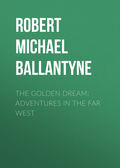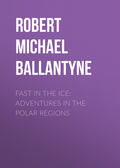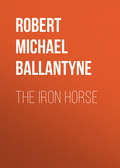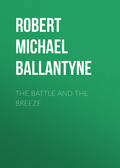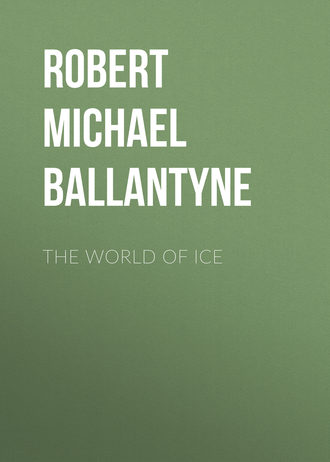
Robert Michael Ballantyne
The World of Ice
CHAPTER XX
Keeping it down—Mutual explanations—The true comforter—Death—New-Year's day.
It need scarcely be said that the sailors outside did not remain long in ignorance of the unexpected and happy discovery related in the last chapter. Bolton, who had crept in after Fred, with proper delicacy of feeling retired the moment he found how matters stood, and left father and son to expend, in the privacy of that chamber of snow, those feelings and emotions which can be better imagined than described.
The first impulse of the men was to give three cheers, but Bolton checked them in the bud.
"No, no, lads. Ye must hold on," he said, in an eager but subdued voice. "Doubtless it would be pleasant to vent our feelings in a hearty cheer, but it would startle the old gentleman inside. Get along with you, and let us get ready a good supper."
"O morther!" exclaimed O'Riley, holding on to his sides as if he believed what he said, "me biler'll bust av ye don't let me screech."
"Squeeze down the safety-valve a bit longer, then," cried Bolton, as they hurried along with the whole population to the outskirts of the village. "Now, then, ye may fire away, they won't hear ye—huzza!"
A long enthusiastic cheer instantly burst from the sailors, and was immediately followed by a howl of delight from the Esquimaux, who capered round their visitors with uncouth gestures and grinning faces.
Entering one of the largest huts, preparations for supper were promptly begun. The Esquimaux happened to be well supplied with walrus-flesh, so the lamps were replenished, and the hiss of the frying steaks and dropping fat speedily rose above all other sounds.
Meanwhile, Fred and his father, having mutually recovered somewhat of their wonted composure, began to tell each other the details of their adventures since they last met, while the former prepared a cup of coffee and a steak for their mutual comfort.
"But, father," said Fred, busying himself at the lamp, "you have not yet told me how you came here, and what has become of the Pole Star, and how it was that one of your men came to be buried in the Esquimau fashion, and how you got your leg broken."
"Truly, Fred, I have not told you all that, and to give it you all in detail will afford us many a long hour of converse hereafter, if it please God, whose tenderness and watchful care of me has never failed. But I can give you a brief outline of it thus:—
"I got into Baffin's Bay and made a good fishing of it the first year, but was beset in the ice, and compelled to spend two winters in these regions. The third year we were liberated, and had almost got fairly on our homeward voyage when a storm blew us to the north and carried us up here. Then our good brig was nipped and went to the bottom, and all the crew were lost except myself and one man. We succeeded in leaping from one piece of loose ice to another until we reached the solid floe and gained the land, where we were kindly received by the Esquimaux. But poor Wilson did not survive long. His constitution had never been robust, and he died of consumption a week after we landed. The Esquimaux buried him after their own fashion, and, as I afterwards found, had buried a plate and a spoon along with him. These, with several other articles, had been washed ashore from the wreck. Since then I have been living the life of an Esquimau, awaiting an opportunity of escape either by a ship making its appearance or a tribe of natives travelling south. I soon picked up their language, and was living in comparative comfort, when, during a sharp fight I chanced to have with a Polar bear, I fell and broke my leg. I have lain here for many months, and have suffered much, Fred; but, thank God, I am now almost well, and can walk a little, though not yet without pain."
"Dear father," said Fred, "how terribly you must have felt the want of kind hands to nurse you during those dreary months, and how lonely you must have been!"
"Nay, boy, not quite so lonely as you think. I have learned the truth of these words, 'I will never leave thee, nor forsake thee'—'Call upon Me in the time of trouble, and I will deliver thee.' This, Fred, has been my chief comfort during the long hours of sickness."
Captain Ellice drew forth a soiled pocket Bible from his breast as he spoke.
"It was your beloved mother's, Fred, and is the only thing I brought with me from the wreck; but it was the only thing in the brig I would not have exchanged for anything else on earth. Blessed Bible! It tells of Him whose goodness I once, in my ignorance, thought I knew, but whose love I have since been taught 'passeth knowledge.' It has been a glorious sun to me, which has never set in all the course of this long Arctic night. It has been a companion in my solitude, a comfort in my sorrows, and even now is an increase to my joy; for it tells me that if I commit my way unto the Lord, he will bring it to pass, and already I see the beginning of the end fulfilled."
Fred's eyes filled with tears as his father spoke; but he remained silent, for he knew that of late he had begun to neglect God's blessed Word, and his conscience smote him.
It were impossible here to enter minutely into the details of all that Captain Ellice related to Fred during the next few days, while they remained together in the Esquimau village. To tell of the dangers, the adventures, and the hair-breadth escapes that the crew of the Pole Star went through before the vessel finally went down, would require a whole volume. We must pass it all over, and also the account of the few days that followed, during which sundry walruses were captured, and return to the Dolphin, to which Captain Ellice had been conveyed on the sledge, carefully wrapped up in deer-skins, and tended by Fred.
A party of the Esquimaux accompanied them, and as a number of the natives from the other village had returned with Saunders and his men to the ship, the scene she presented, when all parties were united, was exceedingly curious and animated.
The Esquimaux soon built quite a little town of snow-huts all round the Dolphin, and the noise of traffic and intercourse was peculiarly refreshing to the ears of those who had long been accustomed to the death-like stillness of an Arctic winter. The beneficial effect of the change on men and dogs was instantaneous. Their spirits rose at once, and this, with the ample supply of fresh meat that had been procured, soon began to drive scurvy away.
There was one dark spot, however, in this otherwise pleasant scene—one impending event that cast a gloom over all. In his narrow berth in the cabin Joseph West lay dying. Scurvy had acted more rapidly on his delicate frame than had been expected. Despite Tom Singleton's utmost efforts and skill, the fell disease gained the mastery, and it soon became evident that this hearty and excellent man was to be taken away from them.
During the last days of his illness, Captain Ellice was his greatest comfort and his constant companion. He read the Bible to him, and when doubts and fears arose, as they sometimes did, he pointed him to Jesus, and spoke of that love from which nothing could separate him.
It was on Christmas day that West died.
"O sir," said he to Captain Ellice just an hour before he breathed his last, "how much I regret the time that I have lost! How I wish now that I had devoted more of my precious time to the study of the Word and to prayer! How many opportunities of speaking a word for Jesus I have neglected. Once, everything seemed of importance; now, but one thing is worthy of a thought."
"True," answered the captain, "'the one thing needful.' It is strange that we will scarce permit ourselves to think or speak of that till we come to die. But you have thought on Jesus long ere now, have you not?"
"Yes," answered West faintly, "I have; but I take no comfort from that thought. When I think of my past life it is only with regret. My hope is in the Lord. What I have been, or might have been, is nothing. One thing I know—I am a sinner; and this I also know—'Christ Jesus came into the world to save sinners!'"
These were the last words the dying man spoke. Shortly after, he fell asleep.
Next day the body of Joseph West was put in a plain deal coffin, and conveyed to Store Island, where it was placed on the ground. They had no instruments that could penetrate the hard rock, so were obliged to construct a tomb of stones, after the manner of the Esquimaux, under which the coffin was laid and left in solitude.
New-Year's day came, and preparations were made to celebrate the day with the usual festivities. But the recent death had affected the crew too deeply to allow them to indulge in the unrestrained hilarity of that season. Prayers were read in the morning, and both Captain Guy and Captain Ellice addressed the men feelingly in allusion to their late shipmate's death and their own present position. A good dinner was also prepared, and several luxuries served out, among which were the materials for the construction of a large plum-pudding. But no grog was allowed, and they needed it not. As the afternoon advanced, stories were told, and even songs were sung; but these were of a quiet kind, and the men seemed, from an innate feeling of propriety, to suit them to the occasion. Old friends were recalled, and old familiar scenes described. The hearths of home were spoken of with a depth of feeling that showed how intense was the longing to be seated round them again, and future prospects were canvassed with keen interest and with hopeful voices. New-Year's day came and went, and when it was gone the men of the Dolphin did not say, "what a jolly day it was." They said little or nothing, but long after they thought of it as a bright spot in their dreary winter in the Bay of Mercy—as a day in which they had enjoyed earnest, glad, and sober communings of heart.
CHAPTER XXI
First gleam of light—Trip to welcome the sun—Bears and strange discoveries—O'Riley is reckless—First view of the sun.
The wisest of men has told us that "it is a pleasant thing for the eyes to behold the sun," but only those who spend a winter in the Arctic Regions can fully appreciate the import of that inspired saying.
It is absolutely essential to existence that the bright beams of the great luminary should fall on animal as well as plant. Most of the poor dogs died for want of this blessed light, and had it been much longer withheld, doubtless our navigators would have sunk also.
About the 20th of January a faint gleam of light on the horizon told of the coming day. It was hailed with rapture, and long before the bright sun himself appeared on the southern horizon the most of the men made daily excursions to the neighbouring hilltops to catch sight of as much as possible of his faint rays. Day by day those rays expanded, and at last a sort of dawn enlightened a distant portion of their earth, which, faint though it was at first, had much the appearance in their eyes of a bright day. But time wore on, and real day appeared. The red sun rose in all its glory, showed a rim of its glowing disk above the frozen sea, and then sank, leaving a long gladsome smile of twilight behind. This great event happened on the 19th of February, and would have occurred sooner, but for the high cliffs to the southward which intervened between the ship and the horizon.
On the day referred to, a large party was formed to go to the top of the cliffs at Red-Snow Valley to welcome back the sun.
"There's scarce a man left behind," remarked Captain Guy, as they started on this truly joyous expedition.
"Only Mizzle, sir," said Buzzby, slapping his hands together, for the cold was intense; "he said as how he'd stop and have dinner ready agin our return."
There was a general laugh from the men, who knew that the worthy cook had other reasons for not going—namely, his shortness of wind, and his inveterate dislike to ascend hills.
"Come, Fred," cried Captain Ellice, who had completely recovered from his accident, "I shall be quite jealous of your friend Singleton if you bestow so much of your company on him. Walk with me, sirrah, I command you, as I wish to have a chat."
"You are unjust to me," replied Fred, taking his father's arm, and falling with him a little to the rear of the party; "Tom complains that I have quite given him up of late."
"Och! isn't it a purty sight," remarked O'Riley to Mivins, "to see us all goin' out like good little childers to see the sun rise of a beautiful mornin' like this?"
"So it his," answered Mivins; "but I wish it wasn't quite so cold."
It was indeed cold—so cold that the men had to beat their hands together, and stamp their feet, and rush about like real children, in order to keep their bodies warm. This month of February was the coldest they had yet experienced. Several times the thermometer fell to the unexampled temperature of 75° below zero, or 107° below the freezing-point of water. When we remind our young readers that the thermometer in England seldom falls so low as zero, except in what we term weather of the utmost severity, they may imagine—or rather, they may try to imagine—what 75° below zero must have been.
It was not quite so cold as that upon this occasion, otherwise the men could not have shown face to it.
"Let's have leap-frog," shouted Davie; "we can jump along as well as walk along. Hooray! hup!"
The "hup" was rather an exclamation of necessity than of delight, inasmuch as that it was caused by Davie coming suddenly down flat on the ice in the act of vainly attempting to go leap-frog over Mivins's head.
"That's your sort," cried Amos Parr; "down with you, Buzzby."
Buzzby obeyed, and Amos, being heavy and past the agile time of life, leaped upon, instead of over, his back, and there stuck.
"Not so high, lads," cried Captain Guy. "Come, Mr. Saunders, give us a back."
"Faix he'd better go on his hands an' knees."
"That's it! over you go! hurrah, lads!"
In five minutes nearly the whole crew were panting from their violent exertions, and those who did not or could not join panted as much from laughter. The desired result, however, was speedily gained. They were all soon in a glow of heat, and bade defiance to the frost.
An hour's sharp climb brought the party almost to the brow of the hill, from which they hoped to see the sun rise for the first time for nearly five months. Just as they were about to pass over a ridge in the cliffs, Captain Guy, who had pushed on in advance with Tom Singleton, was observed to pause abruptly and make signals for the men to advance with caution. He evidently saw something unusual, for he crouched behind a rock and peeped over it. Hastening up as silently as possible, they discovered that a group of Polar bears were amusing themselves on the other side of the cliffs, within long gunshot. Unfortunately not one of the party had brought fire-arms. Intent only on catching a sight of the sun, they had hurried off unmindful of the possibility of their catching sight of anything else. They had not even a spear; and the few oak cudgels that some carried, however effectual they might have proved at Donnybrook, were utterly worthless there.
There were four large bears and a young one, and the gambols they performed were of the most startling as well as amusing kind. But that which interested and surprised the crew most was the fact that these bears were playing with barrels, and casks, and tent-poles, and sails. They were engaged in a regular frolic with these articles, tossing them up in the air, pawing them about, and leaping over them like kittens. In these movements they displayed their enormous strength several times. Their leaps, although performed with the utmost ease, were so great as to prove the iron nature of their muscles. They tossed the heavy casks, too, high into the air like tennis-balls, and in two instances, while the crew were watching them, dashed a cask in pieces with a slight blow of their paws. The tough canvas yielded before them like sheets of paper, and the havoc they committed was wonderful to behold.
"Most extraordinary!" exclaimed Captain Guy, after watching them for some time in silence. "I cannot imagine where these creatures can have got hold of such things. Were not the goods at Store Island all right this morning, Mr. Bolton?"
"Yes, sir, they were."
"Nothing missing from the ship?"
"No, sir, nothing."
"It's most unaccountable."
"Captain Guy," said O'Riley, addressing his commander with a solemn face, "haven't ye more nor wance towld me o' the queer thing in the deserts they calls the mirage?"
"I have," answered the captain, with a puzzled look.
"An' didn't ye say there was somethin' like it in the Polar Seas, that made ye see flags, an' ships, an' things o' that sort when there was no sich things there at all?"
"True, O'Riley, I did."
"Faix, then, it's my opinion that yon bears is a mirage, an' the sooner we git out o' their way the better."
A smothered laugh greeted this solution of the difficulty.
"I think I can give a better explanation—begging your pardon, O'Riley," said Captain Ellice, who had hitherto looked on with a sly smile. "More than a year ago, when I was driven past this place to the northward, I took advantage of a calm to land a supply of food, and a few stores and medicines, to be a stand-by in case my ship should be wrecked to the northward. Ever since the wreck actually took place I have looked forward to this cache of provisions as a point of refuge on my way south. As I have already told you, I have never been able to commence the southward journey; and now I don't require these things, which is lucky, for the bears seem to have appropriated them entirely."
"Had I known of them sooner, captain," said Captain Guy, "the bears should not have had a chance."
"That accounts for the supply of tobacco and sticking-plaster we found in the bear's stomach," remarked Fred, laughing.
"True, boy; yet it surprises me that they succeeded in breaking into my cache, for it was made of heavy masses of stone, many of which required two and three men to lift them, even with the aid of handspikes."
"What's wrong with O'Riley?" said Fred, pointing to that eccentric individual, who was gazing intently at the bears, muttering between his teeth, and clinching his cudgel nervously.
"Sure it's a cryin' shame," he soliloquized in an undertone, quite unconscious that he was observed, "that ye should escape, ye villains. Av I only had a musket now—but I han't. Arrah! av it was only a spear. Be the mortial! I think I could crack the skull o' the small wan! Faix, then, I'll try!"
At the last word, before any one was aware of his intentions, this son of Erin, whose blood was now up, sprang down the cliffs towards the bears, flourishing his stick, and shouting wildly as he went. The bears instantly paused in their game, but showed no disposition to retreat.
"Come back, you madman!" shouted the captain; but the captain shouted in vain.
"Stop! halt! come back!" chorused the crew.
But O'Riley was deaf. He had advanced to within a few yards of the bears, and was rushing forward to make a vigorous attack on the little one.
"He'll be killed!" exclaimed Fred in dismay.
"Follow me, men," shouted the captain, as he leaped the ridge: "make all the noise you can."
In a moment the surrounding cliffs were reverberating with the loud halloos and frantic yells of the men, as they burst suddenly over the ridge, and poured down upon the bears like a torrent of maniacs.
Bold though they were, they couldn't stand this. They turned tail and fled, followed by the disappointed howls of O'Riley, and also by his cudgel, which he hurled violently after them as he pulled up.
Having thus triumphantly put the enemy to flight, the party continued their ascent of the hill, and soon gained the summit.
"There it is!" shouted Fred, who, in company with Mivins, first crossed the ridge, and tossed his arms in the air.
The men cheered loudly as they hurried up and one by one emerged into a red glow of sunshine. It could not be termed warm, for it had no power in that frosty atmosphere, and only a small portion of the sun's disk was visible. But his light was on every crag and peak around; and as the men sat down in groups, and, as it were, bathed in the sunshine, winking at the bright gleam of light with half-closed eyes, they declared that it felt warm, and wouldn't hear anything to the contrary, although Saunders, true to his nature, endeavoured to prove to them that the infinitely small degree of heat imparted by such feeble rays could not by any possibility be felt except in imagination. But Saunders was outvoted. Indeed, under the circumstances, he had not a chance of proving his point; for the more warm the dispute became, the greater was the amount of animal heat that was created, to be placed, falsely, to the credit of the sun.
Patience, however, is a virtue which is sure to meet with a reward. The point which Saunders failed to prove by argument, was pretty well proved to every one (though not admitted) by the agency of John Frost. That remarkably bitter individual nestled round the men as they sat sunning themselves, and soon compelled them to leap up and apply to other sources for heat. They danced about vigorously, and again took to leap-frog. Then they tried their powers at the old familiar games of home. Hop-step-and-jump raised the animal thermometer considerably, and the standing leap, running leap, and high leap sent it up many degrees. But a general race brought them almost to a summer temperature, and at the same time, most unexpectedly, secured to them a hare! This little creature, of which very few had yet been procured, darted in an evil hour out from behind a rock right in front of the men, who, having begun the race for sport, now continued it energetically for profit. A dozen sticks were hurled at the luckless hare, and one of these felled it to the ground.
After this they returned home in triumph, keeping up all the way an animated dispute as to the amount of heat shed upon them by the sun, and upon that knotty question, "Who killed the hare?"
Neither point was settled when they reached the Dolphin, and, we may add, for the sake of the curious reader, neither point is settled yet.



